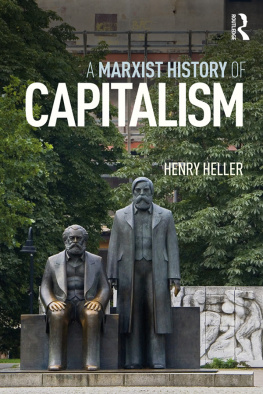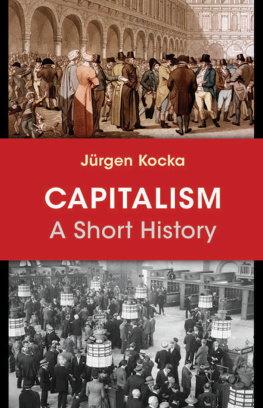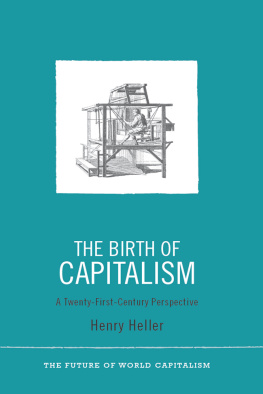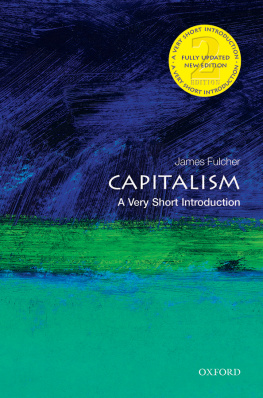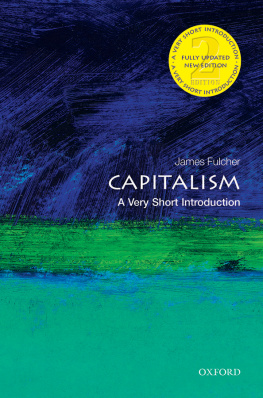A MARXIST HISTORY OF CAPITALISM
Henry Hellers short account of the history of capitalism combines Marxs economic and political thought with contemporary scholarship to shed light on the current capitalist crisis. It argues that capitalism is an evolving mode of production that has now outgrown its institutional and political limits.
The book provides an overview of the different historical stages of capitalism, underpinned by accessible discussions of its theoretical foundations. Heller shows that capitalism has always been a double-edged sword, on one hand advancing humanity, and on the other harming traditional societies and our natural environment. He makes the case that capitalism has now become self-destructive, and that our current era of neoliberalism may trigger a transition to a democratic and ecologically aware form of socialism.
Henry Heller is Professor of History at the University of Manitoba, Canada.
A MARXIST HISTORY
OF CAPITALISM
Henry Heller

First published 2019
by Routledge
2 Park Square, Milton Park, Abingdon, Oxon OX14 4RN
and by Routledge
711 Third Avenue, New York, NY 10017
Routledge is an imprint of the Taylor & Francis Group, an informa business
2019 Henry Heller
The right of Henry Heller to be identified as author of this work has been asserted by him in accordance with sections 77 and 78 of the Copyright, Designs and Patents Act 1988.
All rights reserved. No part of this book may be reprinted or reproduced or utilised in any form or by any electronic, mechanical, or other means, now known or hereafter invented, including photocopying and recording, or in any information storage or retrieval system, without permission in writing from the publishers.
Trademark notice : Product or corporate names may be trademarks or registered trademarks, and are used only for identification and explanation without intent to infringe.
British Library Cataloguing-in-Publication Data
A catalogue record for this book is available from the British Library
Library of Congress Cataloging-in-Publication Data
A catalog record has been requested for this book
ISBN: 978-1-138-49045-1 (hbk)
ISBN: 978-1-138-49587-6 (pbk)
ISBN: 978-1-351-02318-4 (ebk)
Typeset in Bembo
by Swales & Willis Ltd, Exeter, Devon, UK
During the Cold War people were reluctant even to name the system we live under. Today capitalism is all over the media and has become a hot topic. A concept that was once taboo is suddenly on everyones lips. A recent mainstream review of the existing scholarship entitles itself Capitalism: The Reemergence of a Historical Concept (Kocka and Van der Linden 2016).
The end of the Cold War and the financial crisis of 2008 has made it possible to name the system.
Prior to 2008 we were told we stood at the end of history and that capitalism would go on forever. But the bursting of the financial bubble in that year and the ongoing economic malaise since has led to a nagging sense of doubt. People at all levels of society are asking themselves: does capitalism have a future? Reflecting an anxiety widely felt, the future of capitalism has become a popular subject of feature articles in the pages of establishment journals such as The New York Times, The Wall Street Journal, The Guardian, Le Monde, Die Zeit, Der Spiegel and the Financial Times . The history of capitalism is suddenly voguish. The growing importance of the history of capitalism was reflected in an important feature article in The NY Times (Schuessler 2013) and an interesting new entry on Wikipedia (History of Capitalism). New courses and programmes in the subject are proliferating at places such as Harvard, Cornell, Johns Hopkins, the University of North Carolina, the University of Florida, University of British Columbia and the Catholic University. At the beginning of 2018 a new mainstream academic journal with a prestigious list of advisors entitled Capitalism and History was announced.
Even business historians have taken note. In a remarkable keynote address given at the 38th Annual Economic and Business History Society Conference in Baltimore, Lou Galambos of Johns Hopkins pointed to the brilliance of recent books on the history of American capitalism. Based on these works, he forecast that in future the history of business will be written no longer from the point of view of individual enterprises but from the perspective of capitalist society as a whole, including its values, tastes and culture. Galambos takes this position even though he acknowledges that the teaching of the history of capitalism inevitably implies criticism of business rather than apologetics. All the more so as in practice the historical approach to capitalism raises the spectre of Marxism (Galambos 2014).
But here too times have changed. The crisis of 2008 has led to a widespread revival of interest in Marx. Marx has resurfaced in the mainstream media in the form of feature stories with titles such as Marx is Back, What Marx Can Teach Us and Marx Was Right. In university circles the financial crisis and economic malaise had led to a questioning of the neoliberal paradigm and a return to Keynes but also the waning of postmodernism and cultural studies in favour of Marxism (Palmer 2012).
Of course the history of capitalism has always interested Marxists, including Marx, who was certainly a Marxist despite his disclaimers. There is no doubt that Marxs Das Kapital is devoted to analyzing the structure of nineteenth-century capitalism. But Marx conceives of capital as based on an evolving relationship between capitalists and workers that was intrinsically historical. His analytical concepts incorporate and compress much historical material. Moreover, Marx ends the long first volume of his grand opus by offering an account of the historical origins of capitalism through primitive accumulation. Throughout Das Kapital and especially in Volumes One and Three Marxs notes are full of insightful historical insights that are worthy of study in themselves.
Since Marx his followers have continued to take an interest in the history of capitalism because, since at least the time of Lenin and the crisis of World War I, they have sensed that it was in trouble. The subsequent Depression and the devastation of World War II formed the background against which the famous debate on the transition from feudalism to capitalism first unfolded. Discussion was set off by the publication of Maurice Dobbs Studies in the Development of Capitalism (1946). Dobbs work was debated during the next decade in the pages of the American Marxist journal Science & Society at the height of the anti-Communist repression in the 1950s (Hilton 1976). The transition debate reflected the insight of Marxist scholars who understood that capitalism had entered its senescence. Understanding feudalisms demise and the birth of capitalism, it was presumed, could shed light on the end of capitalism and a historical evolution towards socialism. The debate has continued ever since (Heller 2011). This debate has itself been raised to a higher level by increasing discussion of Marxs concept of modes of production that views capitalism as merely a passing phase in human history.
Among Marxists the sense that capitalism has entered its twilight has only deepened in more recent decades. In this light we offer a brief history of capitalism designed for the general public and university students. It is based on an awareness of current scholarship, both Marxist and non-Marxist, but in its premises it is solidly Marxist. Such a history is necessary if only as a counterweight to the growing body of historical scholarship on capitalism that is non-Marxist. The latter aims somehow to recuperate capitalism in the belief that it is still reformable. We do not think so.
Next page
